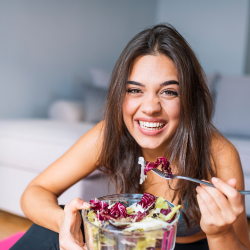Affiliate Disclosure: This blog may receive a small commission at no extra cost to you, for purchases made via affiliate links. If you decide to support our blog in this way, I thank you!
Broccoli Contains:
- Phytochemicals like Sulforaphane
- An Abundance of Vitamins and Minerals
thus it…
- Slows the progression of skin and other cancers
- Slows the Aging Process
- Enhances Skin Immunity
- Reduces Inflammation and
- Improves the skin’s glow

Why Is Broccoli So Good for Skin?
Broccoli’s nutritional content makes it great for skin. Phytonutrients like Sulforaphane, along with many other vitamins and minerals in broccoli, make it a valuable food for overall health as well. Broccoli is considered a superfood for many reasons, but one of the things it is best known for is bolstering skin health. Valid scientific studies have proven that the botanical benefits of broccoli promote everything from youthful looks to skin cancer prevention.
Broccoli is the most powerful of all of the Cruciferous vegetables, which include cabbage, brussels sprouts, bok choy, and cauliflower.
Back in the 1980s, President George H.W. Bush infamously said that he hated broccoli. His mother used to force him to eat it and now that he was grown he wouldn’t eat it. I’m sure his lack of love for broccoli had to do with the way it was prepared. Years ago people used to cook vegetables until they were mushy, and mushy broccoli is awful. In addition, it contains sulfur, which has a strong smell and may be an acquired taste for some. I think it’s delicious when prepared correctly. I make a quick salad by rinsing off my organic head of broccoli and chop the florets into a salad. Eating it raw preserves the powerful cancer-fighting sulforaphane. Cooking it lightly however, is also healthy, as the beta carotene is more available that way.  I lightly steam it with other vegetables, garlic, soy sauce or Bragg’s liquid aminos, good-quality olive oil, and serve it over rice. Sometimes I add walnuts, raisins, or beans. It’s a simple way to get so many nutrients in one delicious meal.
I lightly steam it with other vegetables, garlic, soy sauce or Bragg’s liquid aminos, good-quality olive oil, and serve it over rice. Sometimes I add walnuts, raisins, or beans. It’s a simple way to get so many nutrients in one delicious meal.
Here’s a brief (hopefully) description of the above nutrients:
 Sulforaphane:
Sulforaphane:
A lesser-known nutrient that can be found in broccoli and other cruciferous vegetables. Sulforaphane has been shown by scientific studies to help prevent melanoma and other types of cancers. (Source: University of Pittsburgh)
Sulforaphane helps the body to neutralize the effects of carcinogenic chemicals we absorb from the environment. (Broccoli also contains glutathione which helps the liver to remove environmental wastes.)
In this study from the US National Institute of Medicine website, it is stated that:
Sulforaphane (SFN), which is converted from a major glucosinolate in broccoli/broccoli sprouts, has been shown to prevent chemically induced cancers in animal models and to inhibit the growth of established tumors.
Vitamin A
One of the abundant vitamins present in broccoli is vitamin A, which has been proven through scientific studies to have several major benefits for skin health.
Here are some of the ways in which vitamin A in broccoli can help your skin: (Source: U.S. National Library of Medicine):
• Repairs skin damage: Vitamin A is used by the body for cell regeneration, allowing wounds and breaks in the skin to heal more quickly and completely.
•  Prevents premature aging: Vitamin A is vital for the body’s ability to fight off the kinds of free radicals that can lead to wrinkles, sunspots, rough texture, and laxity of the skin. It also helps to prevent damaged cells from becoming cancerous by encouraging cell turnover. Fresh new cells arise more quickly than in a body that is deficient of this vitamin. We love fresh new cells!
Prevents premature aging: Vitamin A is vital for the body’s ability to fight off the kinds of free radicals that can lead to wrinkles, sunspots, rough texture, and laxity of the skin. It also helps to prevent damaged cells from becoming cancerous by encouraging cell turnover. Fresh new cells arise more quickly than in a body that is deficient of this vitamin. We love fresh new cells!
Broccoli is an excellent source of Vitamin A: a cup of broccoli contains 80% of your daily value for vitamin A. Other excellent sources of Vitamin A include carrots, cantaloupe, peaches, cherries, and apricots. (Source: My Food Data)
Vitamin C
Another important vitamin present in broccoli is vitamin C, which has been proven through scientific studies to be beneficial to skin in various ways.
Here are some of the reasons getting enough vitamin C is crucial for skin health: (Source: U.S. National Library of Medicine):
• Collagen: Vitamin C is essential for the growth of new collagen and elastin. Collagen is of course the substance that gives our skin its bounce and fullness; elastin is the scaffolding that holds everything up (and we all know we need that as we get older!)
• Protects skin from free radicals:  Free radicals are the rogue cells mentioned above that damage skin over time. Vitamin C destroys them, and acts to protect skin from the cumulative damage of UV light and pollutants such as cigarette smoke and toxic chemicals.
Free radicals are the rogue cells mentioned above that damage skin over time. Vitamin C destroys them, and acts to protect skin from the cumulative damage of UV light and pollutants such as cigarette smoke and toxic chemicals.
• Diminishes scarring: Vitamin C naturally speeds up the body’s healing process by causing it to regenerate cells more efficiently. This can diminish scarring caused by wounds or skin conditions like acne.
• Assists in evening out skin tones: For those with an uneven skin complexion, topical vitamin C can help balance the complexion and leave skin more lustrous and radiant.
• Bolsters immune system: Vitamin C works to reinforce the body’s entire immune system, helping to prevent breakouts in the skin caused by bacteria.
Vitamin C isn’t just useful for protecting skin health; it circulates throughout the body’s organs and functions as an overall free radical scavenger and cancer inhibitor.
Beta Carotene
Beta carotene is a provitamin that is only found in plants like broccoli, yams, red bell peppers and other yellow/red vegetables and can be useful for protecting the health of the skin, eyes and the immune system: (Source: University of Rochester Medical Center):
Vitamin E
Like vitamin A, vitamin E has several major benefits that improve skin health, and broccoli is a good source of it.
Here are some of the ways that science has shown vitamin E to help protect and revitalize skin health (Source: Oregon State University):
• Antioxidant activity: Like vitamin C and A, vitamin E helps promote antioxidant activity in the skin, which helps to mitigate the visual effects of aging and promote skin regeneration.
• Skin Moisture: Vitamin E is a major ingredient in many moisturizing skin creams because of its ability to protect collagen and increase the hydration of skin cells.
• Wound healing: Vitamin E is one of the essential vitamins that contribute to cell regeneration, which means that applying vitamin E to the body either topically or internally can help skin breaks heal faster and with less scarring.
• Anti-inflammatory effects: Vitamin E has anti-inflammatory effects on the body, reducing inflammatory skin diseases like acne and rosacea.
Ways to Incorporate Broccoli for Skin Health
 These are several ways to incorporate broccoli both into your diet and into your skincare regimen to protect and enhance skin health.
These are several ways to incorporate broccoli both into your diet and into your skincare regimen to protect and enhance skin health.
Here are a few ways to use broccoli to improve your skin:
• Cooked or raw: Incorporate lightly steamed broccoli into your diet by using it in stir fries, adding it to salads and soups, or using it as a side dish. I enjoy adding it to my Italian minestrone. Either cooked or raw, it is nutritious but in different ways:
Research has shown that the best way to eat broccoli to preserve the sulforaphane is lightly steamed or raw, however when fully cooked, the vitamin A, beta carotene, and vitamin e is more available.
BROCCOLI SOUP RECIPE:  For a delicious broccoli soup, steam a head of broccoli crowns, one yellow potato, and 2 cloves of garlic. Then blend until liquified in a blender. Return to stovetop and add 2 cups unsweetened soy milk, 3 tablespoons soy sauce, black pepper and salt to taste. Top with freshly chopped parsley and green onion for added skin benefits from the glutathione. For additional taste and the benefits of essential fatty acids, drizzle a tablespoon of olive oil on top of each bowl. Serve piping hot!
For a delicious broccoli soup, steam a head of broccoli crowns, one yellow potato, and 2 cloves of garlic. Then blend until liquified in a blender. Return to stovetop and add 2 cups unsweetened soy milk, 3 tablespoons soy sauce, black pepper and salt to taste. Top with freshly chopped parsley and green onion for added skin benefits from the glutathione. For additional taste and the benefits of essential fatty acids, drizzle a tablespoon of olive oil on top of each bowl. Serve piping hot!
- Smoothies: For people who want to incorporate raw broccoli into their diet, adding it to smoothies is a delicious way to go. Here is a recipe for a broccoli smoothie where the taste of the broccoli is hidden by other ingredients, so it isn’t too overpowering.
- DIY FACE MASKS: Raw broccoli is an ingredient that you can add to face masks to apply the nutrients directly to your skin. Just blend broccoli with coconut oil until it forms a thick paste, place it on your face for twenty to thirty minutes and then wash it away. Your skin will be soft and radiant.
- Pre-made skincare products with broccoli: Here is a serum that contains broccoli and provides some of the benefits to your skin:

Acure Brightening Supergreens Serum: This serum feels great on the skin. It’s in a base of hydrogenated olive oil that is light and absorbs well. My skin feels moisturized but not greasy and soaks up all the goodness of broccoli and other greens.
Eat broccoli daily for great skin and health!
To read about another delicious cruciferous vegetable, see my post: Keys to Losing Belly Fat? Focus on Cabbage: 15-minute Dish.




